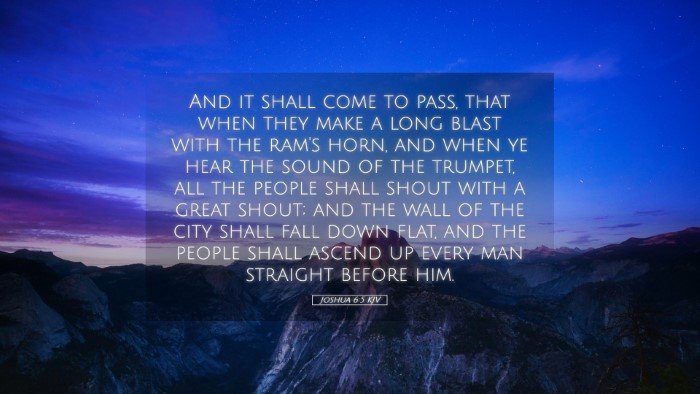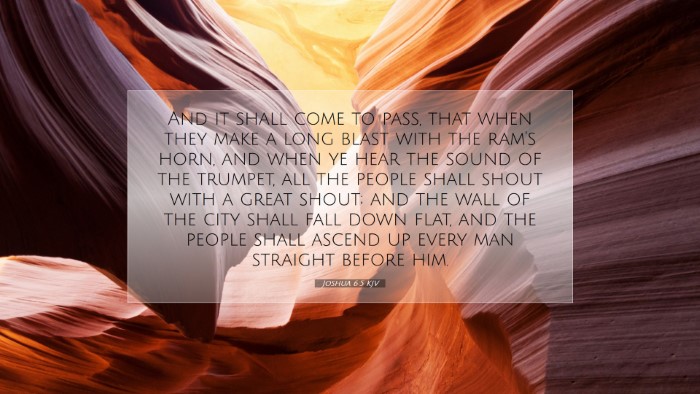Commentary on Joshua 6:5
Joshua 6:5 states:
"And it shall come to pass, that when they make a long blast with the ram's horn, and when ye hear the sound of the trumpet, all the people shall shout with a great shout; and the wall of the city shall fall down flat, and the people shall ascend up every man straight before him."
Introduction
This verse is part of the well-known narrative of the conquest of Jericho, where the Israelites, under the leadership of Joshua, are instructed to take the city through an unconventional strategy ordained by God. This commentary synthesizes the insights of several public domain commentaries and aims to elucidate the theological and practical implications of this verse.
The Military Strategy
At first glance, the strategy appears paradoxical. Commentators like Matthew Henry emphasize that God's ways often defy human logic. Instead of a traditional assault, God instructs Joshua to use sound and faith. The command to blast the ram's horns and shout suggests that faith precedes victory.
Albert Barnes notes that the Israelites were to march around the city for six days in silence, highlighting a period of reflection and assurance in God's promises before executing His command. This method serves to show that success in God's plans relies not on human strength but on divine authority.
The Role of Sound
In ancient Israel, the ram’s horn, or shofar, held significant symbolic meaning. Adam Clarke elaborates that the sound of the shofar was not merely a military signal but a call to worship and proclamation of God's glory. The blast announces divine intervention, affirming that God Himself is the ultimate warrior in their battles.
The act of shouting, as commanded in the text, parallels the joyous proclamation of victory and community praise. This communal act symbolizes unity among the Israelites, reflecting that their strength lies in faith together.
Theological Implications
The promise that the wall would fall “down flat” signifies not just a physical transformation but a spiritual demonstration of God's power. Matthew Henry points out that God's might can overturn seemingly impregnable obstacles when the faithful act in obedience. This serves as a reminder to believers about the efficacy of faith and obedience in God’s plans.
Albert Barnes emphasizes that this moment encapsulates a pivotal point of transition for Israel from wandering to conquering. It is in this act of faith and obedience that Israel receives tangible proof of God's faithfulness, reinforcing the covenant relationship established with them.
Applications for Today's Believers
- Faith in Action: Just as the Israelites followed God's unusual strategy, believers today must recognize that obedience to God may require unconventional actions that don't always align with worldly wisdom.
- Unity in Worship: The collective shout of the Israelites illustrates the importance of unity and shared faith in community worship, calling present-day congregations to cultivate harmony and communal excitement in their faith journeys.
- Divine Assurance: God's promise to overcome obstacles reassures modern believers facing personal Jerichos, reminding them that hidden walls in their lives can be brought low through faith and trust in God's power.
Concluding Thoughts
The narrative surrounding Joshua 6:5 is a powerful testament to God's sovereignty and the importance of faith-filled obedience to His commands. The unique military strategy ordained by God challenges conventional methodologies, inviting both ancient and contemporary audiences to trust wholly in His plans. As we reflect on this passage, may believers be encouraged to embrace faith as a means to see the miraculous while fostering a spirit of unity in worship.


